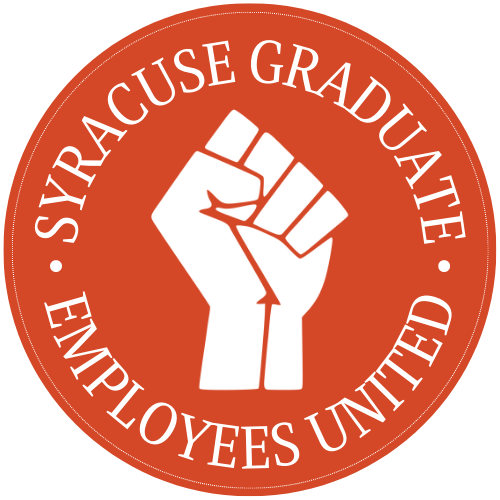Graduate Worker Union Victories
Across the country, graduate assistants are organizing to improve our working conditions, our learning conditions, and the learning conditions of our students – and we are winning!
At Columbia University, grad workers won a retroactive pay increase of no less than 4% for this academic year, plus an additional 2% to cover union dues. Grad workers won an additional 3% increase in each of the next three years, and a minimum salary after dues of $43,100 for 12-month appointments.
At Brown University, all graduate assistants’ stipends raised to a minimum of $42,411.03 per year. From 2020 to 2023, social sciences and humanities assistants won a 35% stipend increase worth $10,892.53 over three years. From 2020 to 2023, sciences assistants won a 21% stipend increase worth $7,376.38 over three years.
Minimum Stipends
International Student Benefits
At the University of Michigan, the University of Washington, and the University of Massachusetts-Amherst, grad workers won the reimbursement of the SEVIS fee, paid leave to participate in immigration proceedings and bereavement leave, and increased protections against bullying and harassment.
At the University of Michigan, grad workers won improved legal resources and the creation of a legal phone hotline international students can call if they encounter issues crossing the border. At the University of Chicago, grad workers won guaranteed summer housing for international students. At the University of Massachusetts-Amherst, grad workers won the creation of committee to provide support with immigration status, visa issues, and legal issues
Maximum Workloads
At Rutgers University and Georgetown University, grad workers are not required to work more than 15 hours. At Brandeis University, teaching fellows and teaching assistants are only required to work 14 hours and 10 hours, respectively. Even despite this reduction in workload, Brandeis grad workers still won increased stipends!
At Harvard University, grad workers capped their workloads to not allow workers to teach more than two recitation sections per semester.
At Columbia University, grad workers won 75% subsidized dental insurance premiums for PhD students and their dependents. At Georgetown University, grad workers won fully covered health and dental insurance. At the University of Michigan, grad workers won fully covered health and dental insurance as well as improved trans healthcare.
Health Benefits
Support for Parents
At Rutgers University, grad workers won up to 14 weeks (1 semester) of paid parental leave. At the University of Washington, grad workers won up to $3,600 per year of childcare subsidies. At the University of Michigan, grad workers won six weeks of paid parental leave, guaranteed lactation spaces on campus, and a childcare subsidy award, which is at a minimum per term $2,940 for one child, $4,310 for two children, and $5,682 for three or more children.
Protections from Discrimination
Grad workers at other universities are winning protections against harassment, discrimination, racism, sexism, and bullying. At the University of Michigan, Columbia University, the University of Connecticut, and elsewhere, grad workers have won the right to independent third-party arbitration or mediation for harassment and discrimination claims, bullying, overwork, and any other employment issues.
At Harvard University, grad workers won legal funding that students workers who are going through the Title IX process can utilize.







